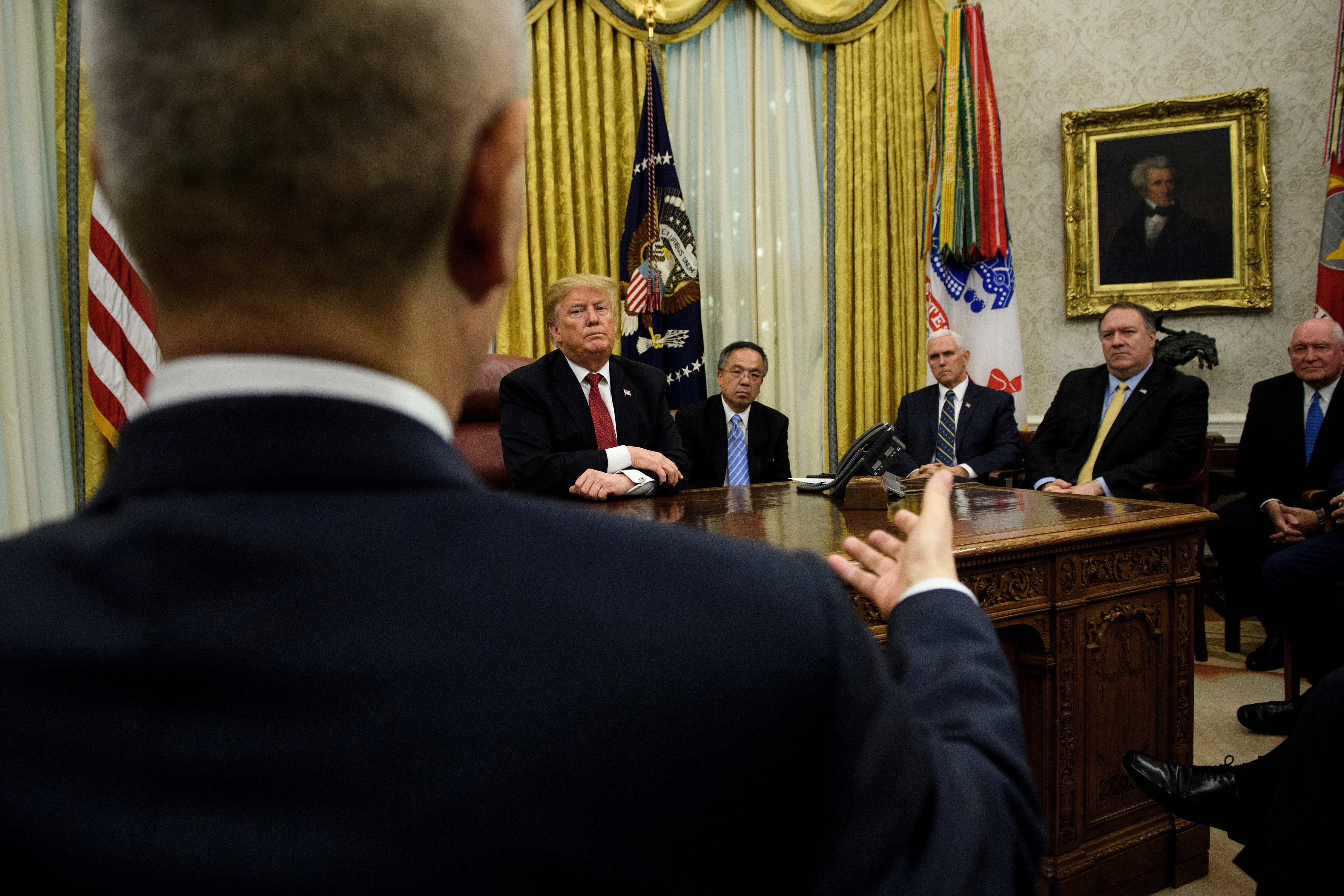Trump hails ‘tremendous’ progress in US-China trade talks
Chinese trade envoy Liu He addresses Trump at the White House on Thursday (Brendan Smialowski)
Washington (AFP) – President Donald Trump on Thursday hailed “tremendous progress” after two days in US-China trade talks, welcoming a “beautiful” letter from his Chinese counterpart Xi Jinping, who said he hoped for further cooperation.
Trump’s comments were an upbeat conclusion to the latest round of talks but the White House emphasized the two sides still faced the “hard deadline” of March 1 to avoid another sharp escalation in their trade war.
Economists say that prospect — which would mean more than doubling US tariffs on $200 billion in Chinese goods — would be a body blow to the global economy.
In a letter from Xi to Trump that was read out by the Chinese delegation, Xi said relations were at a “critical” stage and that he hoped “our two sides will continue to work with mutual respect.”
Trump said relations between the two countries are “very, very good.”
American trade officials are due to travel to China next month for the next round in shuttle diplomacy after which, Trump said, he and Xi will meet to strike the final bargain.
“We have to get this put on paper at some point if we agree. There’s some points that we don’t agree to yet. I think we will agree. I think when President Xi and myself meet, every point will be agreed to.”
With China’s economy slowing sharply and markets on edge at the prospect of further trade disruptions, the stakes for the talks have become especially high.
Last year, Washington and Beijing slapped tariffs on more than $360 billion in two-way trade and US duty rates on $200 billion in Chinese goods are due to rise to 25 percent from 10 percent if no agreement is reached by March 1.
“We haven’t talked about extending the deadline,” Trump said.
– ‘Much work to do’ –
Prior to this week’s talks, Beijing had offered to resume purchases of American soy beans, a key US export, sales of which had plummeted during the trade war, leaving US farmers reeling. Some exports have since resumed.
At Thursday’s meeting with Trump, Liu said China agreed to purchase an extra five million tons of soybeans per day.
“That’s going to make our farmers very happy,” Trump told Liu.
The White House later clarified that the purchase would not be daily and there had been no time frame set.
But, while US officials have welcomed offers to help cut the soaring US trade deficit with China, they are demanding far-reaching changes to Chinese industrial policy.
US officials, including US Trade Representative Robert Lighthizer, say the world’s two largest economies are battling for nothing short of future dominance in critical high-tech industries.
Washington is attacking Chinese trade practices it says are unfair, spotlighting the forced transfer of American technology through requirements that foreign companies form joint ventures with local firms, as well as other methods of allegedly stealing American intellectual property.
“It’s impossible for me to predict success but… it could happen,” Lighthizer said Thursday, noting that the discussions focused on structural matters and ways to enforce any ultimate agreement.
“We have much work to do.”
A little over three years ago, Beijing launched a strategic plan dubbed “Made in China 2025” that aimed to make the nation the global leader in aerospace, robotics, artificial intelligence, new-generation autos and other areas — sectors US officials say now represent the “crown jewels” of American technology and innovation.
Signs of progress in the talks have lifted global stock markets in recent weeks as investors took heart that the world’s two largest economies would avert an economic cataclysm.
The news from the White House emerged just prior to the closing bell on Wall Street, helping stocks bounce slightly higher and adding to the best January for the Dow Jones Industrial Average in 30 years.
Beijing implemented economic stimulus measures to shore up its economy after it last year posted the weakest growth for almost 30 years — underscoring its vulnerability in the trade fight.
But Washington’s aggressive actions against Chinese telecoms firm Huawei — which federal prosecutors accused this week of industrial espionage, sanctions violations and fraud — threatened to upend the talks, drawing irate objections from Beijing.
Disclaimer: This story is published from a syndicated feed. Siliconeer does not assume any liability for the above story. Validity of the above story is for 7 Days from original date of publishing. Content copyright AFP.


